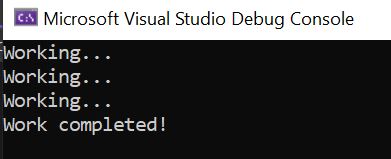`
Delegates CallBack in C#
In this article we are going to discuss how to implement delegate callback with example in C#.
Delegate Callback Introduction
In C#, a delegate callback is a way to pass a method as a parameter to another method, allowing that method to call (or callback) the method you passed. Callbacks are useful when you need to execute certain code after a specific task is completed.
For example, you can use a callback to notify when a file has finished downloading or when a computation has completed.
Using callbacks with delegates in C# provides several advantages, making your code more flexible, modular, and easier to maintain.
Benefits Using a Delegate Callback
- Decoupling Code - Delegates allow you to separate the logic of a method from the logic of a callback. This helps in making your code more modular and easier to manage. By passing the method to be executed as a parameter, you decouple the caller and the callee.
- Asynchronous Programming - Callbacks are often used in asynchronous programming to handle tasks that take an uncertain amount of time to complete (like I/O operations, network requests, etc.). You can pass a callback delegate to be invoked once the asynchronous task is completed.
- Event Handling - Delegates and callbacks are foundational to the event-driven programming model in C#. Events in C# are essentially a list of delegate instances. Callbacks provide a way to respond to events or changes in the state of an object.
- Customizable Logic - By using delegates as callbacks, you allow the caller to customize the behavior of your methods without modifying the method itself. This makes your methods more reusable and flexible.
- Callback Mechanism - Callbacks are useful when you need to execute certain code after a specific task is completed. For example, you can use a callback to notify when a file has finished downloading or when a computation has completed.
Here, I will explain Callback by Delegate.
How It Works
- Define the Delegate - SimpleCallback delegate can point to any method that returns void and takes a string parameter.
- Create a Method to be Called Back - ShowMessage method will be called when the work is done.
- Pass the Method as a Delegate - In the Main method, we create an instance of the Worker class and pass the ShowMessage method to the DoWork method using the delegate.
- Perform Work and Callback - The DoWork method simulates some work, and once the work is done, it calls the ShowMessage method through the delegate, printing "Work completed!" to the console.
using System;
public delegate void SimpleCallback(string message);
public class Worker
{
public void DoWork(SimpleCallback callback)
{
// Simulate some work
for (int i = 0; i < 3; i++)
{
Console.WriteLine("Working...");
System.Threading.Thread.Sleep(1000); //work sleeping for 1 second
}
// Work is done, call the callback method
callback("Work completed!");
}
}
class Program
{
public static void ShowMessage(string message)
{
Console.WriteLine(message);
}
static void Main()
{
Worker worker = new Worker();
SimpleCallback callback = new SimpleCallback(ShowMessage);
//Start the work and pass the callback method
worker.DoWork(callback);
}
}Output

Prev Next
